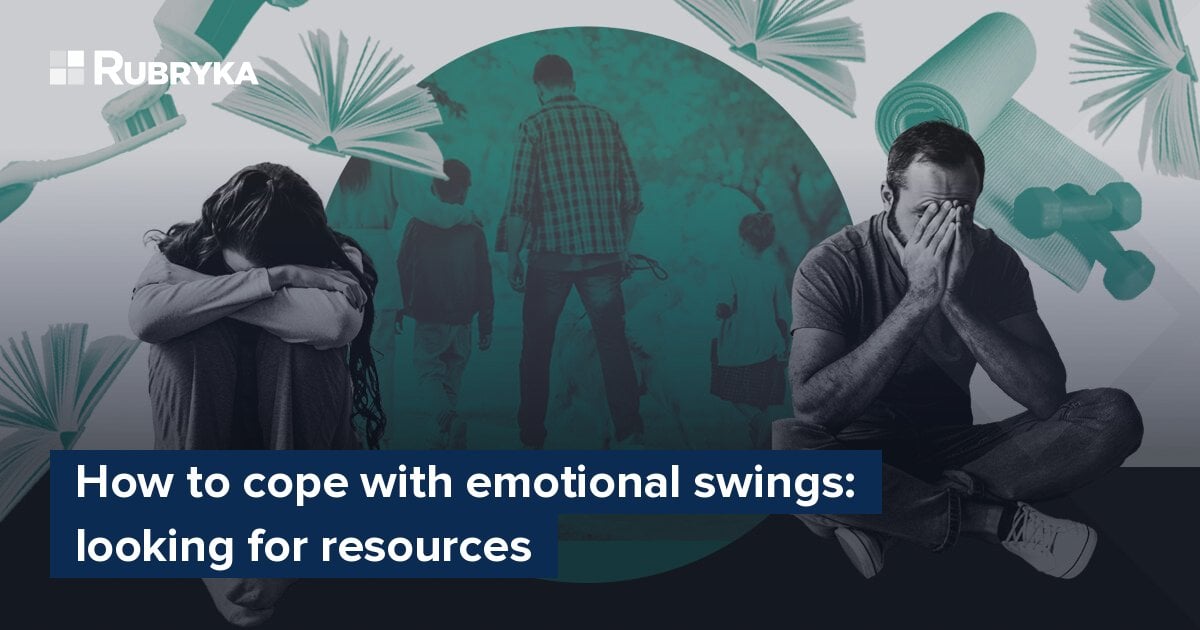
What is the problem?
Ukrainians are currently living in a state of crisis and constant emotional exhaustion. People en masse transmit fatigue, irritation, exhaustion, and anxiety to each other. Emotional swings are exhausting; they do not allow you to work effectively, deal with current affairs, and pay attention to your relatives. Depressive episodes become the norm.
What is the solution?
Learn to compensate for the lack of own resources. Most of us have experienced the loss of resources in the winter when there is not enough light, sun, and heat. Now, seasonal energy shortages are exacerbated by war. But there are ways out of this state and effective tools that everyone can master. Svitlana Lokotkova, psychologist and curator of psychological assistance projects for children and adults in crisis states, talks about how to restore one's resources during the war, what the self-help methods are, and how to increase stress resistance.
How does it work?
Resource is the basis for a sustainable "I"
From the point of view of psychology, a resource is a set of personal properties that allow a person to maintain a sense of confidence, happiness, wisdom, and life experience. It is also about overcoming difficulties and about the inner strength needed to constructively overcome crises.
"What does a person not in a resource look like? Tired and lacks energy. You can often hear someone complain about waking up tired. A person cannot work like clockwork if the body is under intense emotional stress. Exhaustion accumulates and most often puts you in a hospital bed.
It's okay to be out of the resource from time to time, but the basic and very important points are:
- daily care of one's physical and mental health and satisfaction of basic needs;
- maintaining a balance between work and rest, dosed consumption of news, information hygiene;
- finding internal and external resources. To do this, you need to think carefully about things you like, where you relax, fill yourself up, and do them occasionally.
People take care of the battery charge on their phones, monitor the percentages, and look for a source for recharging. It is also worth thinking about your charge of energy and resources. Take care of yourself not when there is anxiety or sad news, and energy is already at zero, but in advance and all the time — every possible minute, pay attention to something pleasant that soothes, brings pleasure, and self-confidence. Everything in the virtual and real world can be used as a recharge for yourself.

Even a longer-than-usual walk with the dog can become such a recharge.
Resource assistance and self-help are needed by everyone, regardless of age, gender, or profession. Personal resources are the same recharge that gives a feeling of fullness and support. These are supplies that we can use when we need them.
Available resources
Resources are divided into:
- external (dances, sports, communication, music, food, memories, etc.);
- internal (strengths, character, needs, values, etc.).
And:
- personal (character traits);
- physical (body abilities);
- environmental resources (interaction with nature);
- cultural and historical, for example, folk traditions;
- figurative (imagination, pleasant memories).
In addition, we can look for resources in four areas:
- body (health, image, intimate life);
- emotions (friendship, love, relationships);
- intelligence (study, work);
- spirituality (faith, creativity, altruism).
"Unfortunately, no universal advice would be helpful and resourceful for everyone. If we metaphorically compare a set of self-help methods, then an individual first-aid kit comes to mind, which each person puts together according to their own needs and at their own discretion," continues psychologist Lokotkova. For example, if we are preparing for a trip, everyone will put in their first-aid kit, some pain reliever, something for indigestion, some anti-pressure medicine, etc. However, each point will be individual, and everyone will choose the pills that suit them. The first aid kit for emotional self-help is based on this principle.

Svitlana Lokotkova. Photo from personal archive
Filling out the resource first aid kit
First of all, it is worth noting that there are several ways to obtain a resource:
- easy ones that are readily available (a warm drink, a family photo, looking for beautiful autumn leaves under your feet, your favorite music);
- those that require some effort — time, financial investment, the participation of another person (cooking pastries, going to the movies, playing board games with friends);
- important — those that cannot be obtained quickly, require preliminary preparation, planning, participation, or help from the outside (travel, meeting with relatives whom you have not seen for a long time, etc.).
For self-help, Lokotkova recommends using a list of tasks and pleasures compiled by one of the volunteer projects on restoration and resourcing. Such exercises to restore the resource do not require special efforts and costs but can be very helpful.
The list contains more than 500 items, so some of the ideas will be useful. Below, Rubryka has selected 30 of them, which can be used especially in winter:
- Actively communicate with nice people in a safe space.
- Fragrances: candles, perfumes, body cosmetics, incense sticks.
- Feed the ducks.
- Run, ski, or skate.
- Listen to lectures on YouTube about science, space, spirituality, and philosophy and discuss them with friends.
- Take a coffee-to-go and drink it on the street.
- Wander through a fabric store, picking and touching.
- Lie in bed with loved ones, eat delicious food, and watch a movie.
- Take a bath with sea salt and foam.
- Ask yourself thoughtful questions that cannot be answered immediately.
- Drink and create delicious teas — from combinations of herbs and all kinds of teas. Brew mulled wine.
- Work with the dough.
- Knock mistletoe off the trees.
- Remember something good with friends or family.
- Throw away unnecessary garbage and junk, and put things in order at the workplace.
- Burn on wood, paint pictures by numbers.
- Cook a lot and deliciously, and then treat someone.
- Eat chips.
- Make gifts.
- Take funny and beautiful selfies.
- Keep a promise.
- Enjoy the smells: coffee, lemon in hot water, spices at the market, or a delicious hand cream.
- Write down dreams and short notes — what I think about and what interests me.
- Go on a winter raid to fill animal or bird feeders.
- Look at the paintings of the surrealists.
- Buy something at the flea market, or just walk through it.
- Explain something complex to a child so that they understand.
- Dress in one color from head to toe.
- Lie down and listen to the silence.
- Hug animals.
"If you are in a crisis and have no ideas how to help yourself, go through this list and take a method that suits you to feel better," comments Lokotkova. The more points you try to add to your life, the greater the chances that you will feel better, even on a gloomy, cold day. Also, keep a notebook or note on the computer where you record and collect your own points to support yourself, using them as a burnout prevention.

Some get support by watching movies, and others by reading books. Illustrative photo
The psychologist adds that although we metaphorically compare the collection of resources with the filling of a first-aid kit, a resource is not medicine but rather vitamins, a set of possibilities that we use to solve any life tasks.
Can the resource be shared with your loved ones?
"Relatives should be allowed to use their resources, what strengthens this person, and your resources are only yours," notes Lokotkova. It's better to listen to what is a resource for your loved one or help them find their resource points if they haven't already done so.

You may be able to help a loved one find their own resourceful activities, but it may not be the same as what works for you. Illustrative photo
There may be such a situation when the hugs of loved ones are a resource for someone in the family, and for another, it is an unwanted tactile sensation. In such cases, you should look for a compromise. It may be appropriate to hug a pet, find a soft cuddly toy for yourself, or agree that a loved one, knowing the healing power of their hugs, will share them when they are ready for it. In any case, everything must be discussed.
Remember that long-term stress has a negative effect on all body functions. If you feel that you cannot restore the resource yourself or trace what is wrong with you, seek help from a psychologist.
Even more useful solutions!
How to increase the level of stress resistance
"We cannot change what is beyond our control, but we can rethink our attitude to it," Lokotkova is confident.
If you feel a lot of tension, let your emotions out — tear up a few sheets of paper, shout, go for a run, or just be alone. The main thing is to listen to your desires.
After that, we remember our resource first aid kit and "get" from it what we can use now. It is also worth stocking up on various calming techniques — breathing techniques and grounding exercises for relieving muscle tension. You should listen to your condition and sometimes just give yourself time to recover in your sleep.
How to focus on your condition? Listen to the body. Our body is the first to react to what is happening to us and gives signals. However, people often do not listen and ignore the body's hints.

Traveling and even just going for a walk is a great way to reset your thoughts. Illustrative photo
Therefore, Lokotkova advises that monitoring your condition should be like morning hygiene procedures — brush your teeth, measure your mood, assess your condition, and recharge before the start of a new day.
Allow yourself to be tired, excited, and feel different emotions because this is normal. All emotional reactions in abnormal conditions are normal, so everything you feel has a place and needs attention. Give yourself exactly the kind of attention you want to receive. You can afford what you really want, and the main thing is that it gives you strength and energy to continue doing what you are doing.
Three exercises that will help "digest" negativity
- The well-known method of reformatting negative thoughts into positive ones can come in handy. This is the so-called Pollyanna game. The heroine of the famous literary work, having challenging life circumstances, tried to look for the positive in everything. Of course, this is not an easy task, and not every person can do it, but if you wish, you can try to practice.
- Circle of worries exercise can also be useful. Its purpose is to sort all the thoughts that make you worry and spin them in your head one by one. First, you need to make a list of topics that provoke excessive anxiety. Awareness is an important step.
- It's really impossible not to think about all this. However, let the process only take ten minutes. Allow yourself to worry and think during this time, but when the time is up, you need to move on to productive activities. A radical change of activity will work effectively: hot shower, game, jogging, conversation, general cleaning, or volunteering. An excessive number of thoughts, which are usually about worries, leads first of all to chronic fatigue — first emotional and then physical. Therefore, it is worth remembering the hygiene of the body, thoughts, and soul, as well as throwing away garbage from the house, bad thoughts from the head, and stones from the heart.
Newsletter
Digest of the most interesting news: just about the main thing








